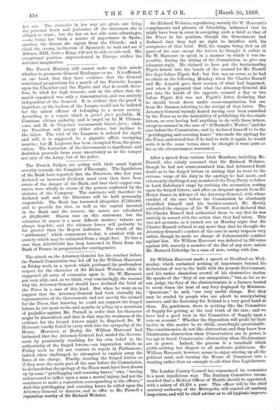The attack on the Attorney-General for his conduct before the
Parnell Commission was led off by Sir William Harcourt on Friday week, in a speech which professed the profoundest respect for the character of Sir Richard Webster, while it suggested all sorts of calumnies upon it. Sir W. Harcourt put very ably, and, as we think, very convincingly, the reasons why the Attorney-General should have declined the brief of the Times in a case of this kind. But when he went on to suggest that the Attorney-General had been virtually the representative of the Government, and not merely the counsel for the Times, that knowing he could not support the forged letters, he yet spent weeks and months in piling up a mountain of prejudice against Mr. Parnell in order that his character might be discredited, and that in that way the weakness of the evidence for the forged letters might be disguised, Sir W. Harcourt totally failed to carry with him the sympathy of the House. Moreover, at Derby, Sir William Harcourt had intimated that the Attorney-General had misled the Govern- ment by persistently vouching for his own belief in the authenticity of the forged letters,—an imputation which on Friday week he did not venture to repeat in Parliament; indeed, when challenged, he attempted to explain away the force of the charge. Finally, treating the forged letters as if they were the main part of the case before the Commission, he declared that the apology of the Times must have been drawn up by some " pettifogging and cozening knave," who, " having endeavoured to inflict upon a man a mortal injury, had not the manliness to make a reparation corresponding to the offence." And this pettifogging and cozening knave he called upon the Attorney-General to disavow, and to offer to Mr. Parnell a reparation worthy of Sir Richard Webster.


















































 Previous page
Previous page